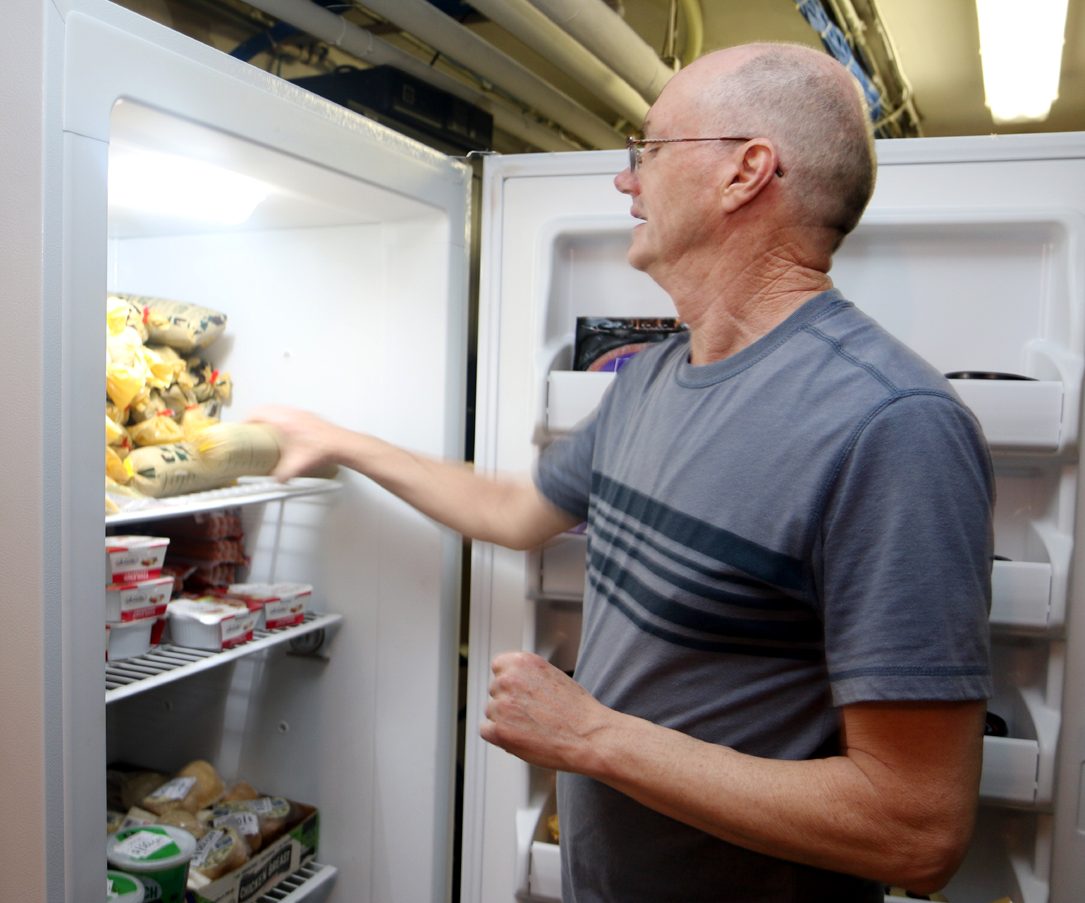
In this undated 2018 photo, volunteer Tim Rizzo stocks a refrigerator with perishables at Mary’s Cupboard, a Levittown pantry supported by archdiocesan Nutritional Development Services. (Sarah Webb)
Inflation is prompting a spike in both calls and costs for an archdiocesan hunger relief agency, say administrators.
“There are many more phone calls from seniors asking where food cupboards are,” said Denise Hopkins, administrator of the Community Food Program for archdiocesan Nutritional Development Services (NDS). “And there are more calls from food cupboards we’ve never worked with before, asking for deliveries.”
For close to 50 years, the agency has been countering food insecurity in the five-county archdiocesan area by operating federally funded child nutrition programs and privately supported food cupboards.
Typically, NDS provides its affiliated pantries with monthly deliveries – but a recently added cupboard “asked if we could come weekly” to meet growing demand from senior clients, said Hopkins.
In the 12-month period from February 2021 to February 2022, the Consumer Price Index (CPI) rose 7.9%, with gasoline, housing and food indexes leading the highest inflation levels in four decades.
[hotblock]
Seniors are particularly vulnerable to such trends as they stretch fixed incomes to cover food, housing and medical needs, said Hopkins and NDS executive director Lizanne Hagedorn.
“Rents have gone up as well as utilities,” said Hagedorn. “I can only imagine the shock at the supermarket.”
NDS itself is facing sharp increases in large-scale supply purchases, she and Hopkins said.
“Last year, a big order from a purveyor would total $35,000,” said Hagedorn. “This year, the same order costs $40,000.”
Supply chain and transportation issues complicate the purchasing process, resulting in less variety at a higher fee.
“Some of the vegetables I would purchase for our food cupboards aren’t there, and sometimes (purveyors) don’t have canned chicken or tuna,” Hopkins said.
“There are problems manning meat processing plants, plus the price of feed has gone up,” said Hagedorn. “Then you throw a fuel surcharge on it, and you can see there’s a lot happening right now.”
To stock its pantries, NDS is hosting a Lenten One-Can Meal Drive through April 12, while gearing up for additional fundraising initiatives in the coming months.
Hagedorn and Hopkins also recommended several strategies for navigating the crunch at the cash register.
“Try to take advantage of federal benefits for which you qualify, such as Supplemental Nutrition Assistance Program (SNAP),” said Hagedorn. “This year, all (federally funded) meals in schools are free for every child; that helps immensely when children eat breakfast and lunch and school.”
Low-income seniors can see if they qualify for meals through the Philadelphia Corporation for Aging, Meals on Wheels and Caring for Friends, she said.
Shop strategically – and not while you’re hungry, Hagedorn added.
“Buy produce and fruits that are in season,” she said.
Meal planning is key, said Hopkins, while Hagedorn recommended online shopping for those prone to impulse purchases.
“For people who are really struggling, it’s just about taking the time to plan, and to try and stretch your budget as much as you can,” she said. “Still, it’s really hard.”
PREVIOUS: Seminarians prepare 4,000 meals for the needy at Caring for Friends
NEXT: Church making progress to prevent child abuse, says victim advocate



Share this story